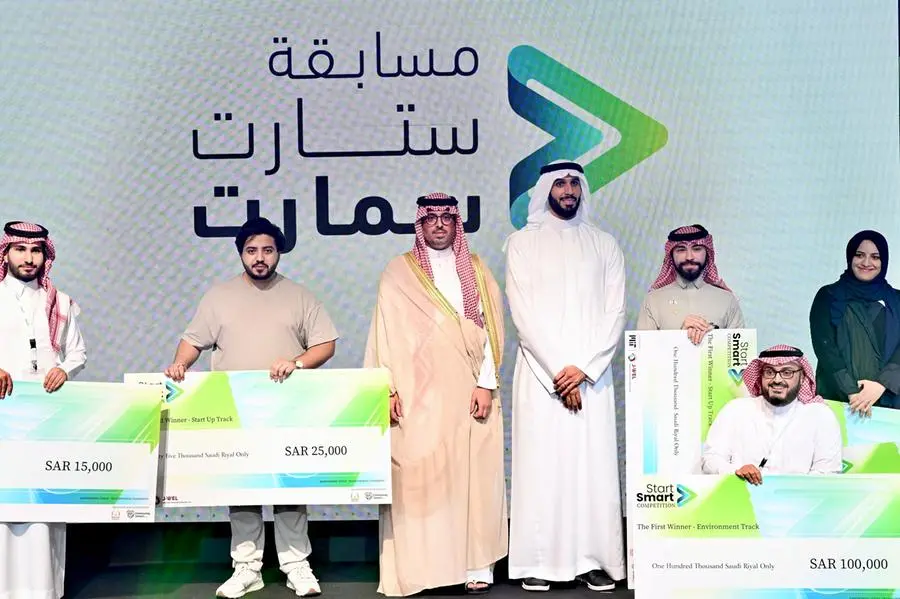PHOTO
Jeddah, Kingdom of Saudi Arabia: Under the patronage of His Highness Prince Saud bin Abdullah bin Jalawi, Governor of Jeddah, Community Jameel Saudi successfully concluded the 7th edition of the StartSmart competition, in the presence of His Royal Highness Prince Khalid bin Sultan bin Abdullah bin Faisal, Chairman of the Saudi Automobile and Motorcycle Federation, Abdulaziz bin Muhammad Bin Aboud, Director of the Ministry of Sports Branch in Makkah Region, and a number of business leaders and experts.
The concluding ceremony was organised at Jeddah Corniche Circuit by Bab Rizq Jameel and Lenobadir program, in partnership with the Ministry of Sports, under the theme of “Applications of Artificial Intelligence in Entrepreneurship and the Green Economy”. This year’s edition featured four distinct tracks: Startups, Ideas, Social Enterprise, and the newly launched Environment track.
The competition witnessed remarkable participation, drawing 1,010 applicants, with 60 teams qualifying for the semi-final stage. The teams underwent an intensive training camp last July, covering a variety of topics, including strategic planning, marketing, and financial management. The qualifying teams presented their projects and ideas to a judging panel, resulting in the selection of 36 teams for the final stage, out of whom 12 winning teams (3 teams within each track) were selected and awarded valuable prizes that amounted to 465,000 Saudi riyals.
In the Startups track fanZ grabbed the first place, Siolla came second, and Ballurh secured the third place. In the Social Enterprise track AmplifAI health won first place, Bahaa Adaptive Solutions ranked second, while Ad Astr came third. As for the Ideas track, Rafah AI secured first place, Organic Waste Management came second, and Maqarri grabbed third place. In the new Environment track, SARsatX won first place, Ivvest ranked second and TrustiT came third.
On the sidelines of the event, Community Jameel Saudi held a forum that included a conference and 8 workshops. The forum featured 8 expert speakers who discussed some of the most important trends, challenges, and opportunities in the entrepreneurial sector and the market overall.
-Ends-
About Community Jameel Saudi
In 1945, the late Sheikh Abdul Latif Jameel established a commitment to giving back to society, spearheading philanthropic initiatives, and launching social welfare programs. Decades of dedication to philanthropy led to the formation of Abdul Latif Jameel Community Services Programs in 2003. Building on the foundation of nurturing societal growth, Community Jameel Saudi, a dedicated entity spearheading societal and developmental programs supporting socio-economic development, was established in 2010.
Community Jameel Saudi is committed to supporting Saudi communities through strategic development pillars focused on Competency Development, Women Empowerment, Entrepreneurs Advancement, Community Wellbeing, Science and Technology, Preserving the Environment, Inspiring Innovation, Continuous Development of Education and Humanitarian Initiatives.
About Bab Rizq Jameel
Bab Rizq Jameel (BRJ) is a social enterprise that was established in 2003 as a part of Community Jameel Saudi Foundation’s family (formerly known as Abdul Latif Jameel Community Initiatives). We aim to train Saudi youth to acquire the necessary skills in alignment with the needs of the labor market, and connects them with suitable job opportunities and sources of income. This is achieved in cooperation with a vast network of training and recruitment partners, allowing us to serve three categories: income opportunity seekers, those looking for training, and employers or project owners.
BRJ model is based on empowerment, where we give our community members the ability to find sources of income on their own, and assist them in improving their living standards and contributing to the development of the Saudi economy. Moreover, our services allow business enterprises access to a pool of highly-skilled and qualified workforce, which will assist in achieving Vision 2030’s goals of decreasing the unemployment rate to 7% by 2030, increasing the percentage of local content, and reaching the localization quotas per the Ministry of Human Resources and Social Development plans.




















